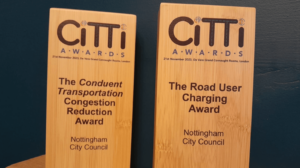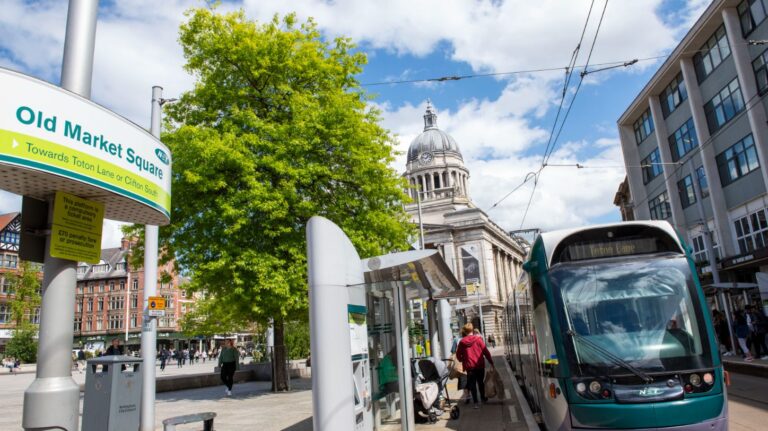Reuben Henry-Fellows unpacks Nottingham City Council’s transformative Workplace Parking Levy and how the scheme’s reinvestment programme is powering the modernisation of its transport network…
In the mid 2000s, Nottingham City Council (NCC) faced worsening air quality, ageing infrastructure, mounting transport costs and an increasingly congested city – with congestion growth projected to increase 15% by 2021. As far back as 2007, congestion was costing Nottingham’s economy £160m annually. An economic crisis and potential health catastrophe loomed large for the city of rebels, and something had to be done.
However, back then, clean air zones (CAZs) did not yet exist, and all that Nottingham had to go on was London’s Congestion Charge zone, which had launched in 2003. At the time, NCC looked at the London scheme and saw what it deemed as a lack of an operational framework designed around smaller cities with less throughflow. It also deemed the associated expenses of installing monitoring equipment and infrastructure as similarly impractical, not least because Nottingham was actively seeking to reduce its operating costs, not increase them.
So, to improve congestion, improve its air quality and keep and attract businesses in the city, NCC decided to embark on a wholly new direction. Innovating on the guidelines established in the Transport Act 2000, which enables local authorities to introduce road user charges, in 2012 the council became the first local authority in the UK to introduce the Workplace Parking Levy (WPL) – a pioneering and innovative approach toward urban transportation management and funding that aims at encouraging more efficient use of road space and funding improvements in public transport.
Unlike other road user charging schemes that tax the user (or commuter) directly, the WPL is a charge on employers who provide parking spaces in Nottingham. Specifically, it is levied on businesses with more than 10 parking spaces allocated for staff use within the designated charging zone of Nottingham city. Employers are charged £522 per parking space, per year and are required to license their parking spaces. NCC ensures compliance through a combination of self-reporting by businesses, audits, and inspections. Exemptions and discounts are available, with small businesses with fewer than 11 spaces exempt, as are certain types of parking spaces such as those for electric vehicles (EVs) or for disabled employees.
FAST FACT: The Workplace Parking Levy has saved Nottingham £15m per year since charging began in 2012. Source: Nottingham City Council
NCC’s head of parking and transport services, Jason Gooding, reflects on the pressures that facilitated the creation of the WPL. “In Nottingham, regionally there’s a lot of competition, so we don’t want to become anti-car, anti-business or be a complicated city to get into and out of. We didn’t want Nottingham to be a city with lots of different charges and felt a WPL was the best solution overall.”
According to Gooding, by placing the financial burden on the employer rather than the employee, the perception of travelling into Nottingham city centre would remain a positive one and the impact on local people would be greatly lessened. Accommodating both factors was vital to the scheme’s viability as the WPL hinged on utilising Nottingham’s high level of commuter parking – accounting for 70% of all city parking.
The Transport Act 2000 that enabled the creation of the WPL also stipulated that any revenue generated through a road user charging scheme must be ringfenced exclusively for reinvestment into public transport. Thus, revenue generated from the WPL has been used to fund the extension of Nottingham’s tram network, improvements to the city’s bus services, and development of other sustainable transport initiatives.
WPL service manager at NCC, Nigel Hallam, details how creating avenues for increased public transport funding has been vital to transforming Nottingham into a modern, business attractive city. “The academic evaluation of the WPL says that all the positive transport improvements are attracting new businesses to either move to bigger premises in Nottingham or to come and do business in Nottingham in the first place.”
Contentious beginnings
Implementing road user charging schemes in the UK, no matter their intended beneficiaries, has historically proven controversial. London’s Congestion Charge was met with vocal opposition before, during and following its introduction, with a London Chamber of Commerce study in November 2003 estimating that 79% of shops had reported a fall in income while traffic had decreased by only 11% by 2023 – most of which has, residents claim, been pushed to outer London as commuters aim to avoid charges, thereby increasing congestion in local neighbourhoods.
“If you follow our roadmap, you will deliver a WPL scheme within one electoral cycle” – Nigel Hallam, Workplace Parking Levy service manager, Nottingham City Council
In 2023, plans for a Greater Manchester CAZ drew huge protests, temporarily shelving the proposal, while the most recent expansion of London’s Ultra Low Emission Zone continues to incite fractious debate and numerous illegal attempts to vandalise or destroy the automatic number plate recognition cameras used to enforce the scheme.
In terms of ruffling feathers, Nottingham’s WPL was no different. When the scheme’s business case was first drafted, the East Midlands Chamber of Commerce responded with vocal media opposition. Citing the Transport Act 2000 clause that required councils to reinvest funds into public transportation modernisation and improvement projects, the organisation requested for evidence to be presented on what these developments would entail should the scheme proceed.

NCC officials responded by ensuring that a variety of supportive and inclusive measures would be added to the creation process, including the establishment of a WPL legal order and business case, a two-year delay to facilitate the creation of a business adaptability grace period, and a city-wide communications campaign to encourage company compliance.
What’s more, the official launch of the WPL, on 01 October 2011, was preceded by a year of online registration work, front- and back-office IT, a three-month period of parking place registration and a series of public consultations. Employee handbooks, small business leaflets and an online licence registration and management system were also developed ahead of the scheme’s rollout. And, to ease businesses into the daily routine of the WPL, a six-month grace period followed the scheme’s launch, ensuring that, by April 2012, when employers were legally required to apply for their WPL licences and charging commenced, employers were fully prepared for all financial recourse.
According to NCC, an extensive period of consultation – one that lasted nearly six years – was imperative not only to convince businesses and opposition of the merits of the scheme, but also to foster a positive environment conducive to establishing a cost-effective system of compliance. “There is always a balance to strike when you’re implementing a contentious scheme such as the WPL, which does have a direct financial impact on businesses providing parking,” says Hallam.
“In Nottingham, we give 80% of businesses a 100% discount from the levy, so it’s pretty much only targeted at the top 20% largest companies. You’ve got to balance the charge of the WPL with reattracting businesses and the risk of losing business. We achieved 100% compliance within six months in year one and we’ve never fallen below 100%.”
FAST FACT: Nottingham’s Workplace Parking Levy was the first of its kind in Europe when it was introduced in October 2011 – and remains the only such scheme in the UK in 2024. Source: Nottingham City Council
Despite its noble aim of decreasing car usage and reducing traffic congestion, the WPL has faced criticism. Councillor Kevin Clarke, opposition leader of the Nottingham Independent Group, once described the WPL as a “tax on work”. And for the 20% of businesses in Nottingham that are liable, the levy unquestionably imposes an extra financial burden, especially those with large parking facilities.
Thus, employers can decide whether to absorb the cost, pass it on to employees – seen as a regressive measure, disproportionately affecting lower-income workers who rely on their vehicles, or reduce parking provisions, each of which has its own repercussions. Some businesses argue that the WPL puts them at a competitive disadvantage, especially when compared to companies operating just outside the levy zone or in different cities.
And yet, the WPL has fought off such criticism over its 12 years of existence, which, in Hallam’s eyes, constitutes success. “Our goal was fundamentally around constraining congestion growth and, to that end, the WPL has proven to be successful. It’s a demand management scheme and the demand management impact is strongest when the charge is passed on to the vehicle user, which represents about 42% of liable workplace parking places in Nottingham.”
“When you look at the business case of the WPL and consider what we’re going to have to live with if we didn’t do it, then the WPL was absolutely worth the risk” – Jason Gooding, head of parking and transport services, Nottingham City Council
Support from NCC for businesses since the WPL’s inception has, however, remained consistent and easily accessible – with support provided to more than 450 companies so far. Comprehensive communications campaigns continue to this day and include initiatives such as mailouts to more than 5,000 employers, a dedicated hotline, website and email contact with staff trained to deal with day-to-day inquiries, employee workshops, and consultations and presentations detailing the progress of the WPL with employer organisations including the Federation of Small Businesses and East Midlands Chamber of Commerce.
Alongside these measures, NCC also launched a small grants scheme, funded through WPL revenue, offering up to £10,000 to encourage uptake of sustainable transport modes, in addition to helping companies put car park management schemes in place. In 2017, the programme was expanded and rebranded as the Workplace Travel Servicem, offering increased grants up to £25,000. Funds were made available for cycle shelters, installation of EV chargepoints and for the purchase of electric bicycles and cargo bikes. As of 2023, more than £1m in grant funding has been awarded.
“We operate at less than 5% of WPL income, whereas the London Congestion charge has an operating cost of about 30%,” says Hallam. “We’ve collected £103m and, out of that, we have only had to write off about £12,000 in bad debt, which is a compliance or revenue collection rate of 99.99%.”
Parking success
In 2022, NCC commissioned a study to measure the impacts of the WPL 10 years on and concluded that more than £1bn had been reinvested into Nottingham through a combination of WPL charges, the council and WPL-funded initiatives and services. During this period, Nottingham’s tram network more than doubled in size, with a £570m extension funded through financial levers provided by WPL funding. An additional £200m has been levered for bus network improvements – NCC also currently operates 29 electric buses, which were funded through the WPL, with another 78 EVs also securing funding.
The uptake of EVs through WPL funding has also had an impact on the environmental effects of congestion. According to X, since 2012, congestion in Nottingham has decreased by 47% and vehicle-related carbon emissions have fallen 58%, while NCC estimates that WPL-associated schemes and funded initiatives will take 2.5 million cars off Nottingham’s roads, thereby reducing traffic congestion by a further 7% in the future.

During the same period, there has also been an increase of 23,400 jobs in the city, a 26% growth of new businesses and there are 8,300 fewer unemployed people. In total, 2,600 new companies have been created in Nottingham and 67% of businesses that have relocated there cited good transport links as a major factor in their decision making. All in all, £100m has been invested directly into Nottingham businesses through contracts generated by the tram and station works – with the NET Phase Two scheme alone employing around 1,200 people – with savings generated directly for businesses at £7.7m.
Future feasibility
Despite the many direct and indirect successes of the WPL in Nottingham, no other local authority in the UK has rolled out the concept. Bristol City Council commissioned NCC to produce a WPL feasibility study in 2021 as a potential option for funding upgrades to the city’s public transport network. However, in August 2023, then-Bristol mayor Martin Rees announced that the plan had been scrapped. Likewise, Leicester dropped its own WPL plan in November 2022 owing to the impact of the cost-of-living crisis on people’s finances.
Why has Nottingham succeeded where others have either failed or not attempted to replicate? Nottingham has been under a Labour majority since 1991 and, according to Gooding, consistent government leadership was vital to cementing the foundations of the WPL scheme in its early years. “When you look at a long-term transport strategy, our WPL was in for 30 years minimum. It looked at funding the tram and long-term transport strategy.”
In other cities, the short-term nature of government office tenures encourages adherence to popular, quick fixes. The necessity of the WPL – congestion – required a concerted approach, and the need for such stability became evident during the Covid-19 pandemic when an increase in remote working led to a notable decrease in the number of businesses paying the WPL. There was a significant drop in the number of licensed parking spaces in Nottingham, which raised questions about the long-term viability and effectiveness of the levy, especially in the context of changing work patterns.
However, belief in the effectiveness of local government and its long-term transport strategy helped NCC continue with its development plans and delivery of services on the way to economic recovery. Gooding says: “When you look at the business case of the WPL and consider what we’re going to have to live with if we didn’t do it, then the WPL was absolutely worth the risk. But to go second now would be difficult. Covid has put a different slant on the concept, people are questioning its relevancy as more people work from home. The cost-of-living crisis also makes it harder to justify the roll out a WPL today.”

In UK cities outside of London, delivering an effective, efficient and modern transport network has become increasingly important and difficult. Researchers from the University of Leeds, on behalf of Friends of the Earth, suggest that 80% of bus services outside the UK capital city have either declined or been removed in the last 15 years. In this same period, NCC has invested £120m, sourced from the WPL, into its bus network, resulting in a peak annual demand of 58 million passengers, the world’s largest fleet of biogas buses (120 double-decker buses) and savings of 1,050 tonnes of CO2 per year.
Despite being the only council to have rolled out a WPL, Gooding believes “we will see another local authority, at least one, go live in the next three to four years, because the government is sponsoring this and is not against it”, while Hallam issues a stark warning: “The challenge for local authorities is, if it’s not WPL, what else are you going to do to find that local revenue stream, to do the projects that you want to do to improve transport and the environment in your area? We’re actively working with colleagues north of the Scottish border on the concept and there’s lots of talk of about Wales doing it, too.”
In November 2023, Oxfordshire County Council released the first draft of its budget for 2024, which included plans to invest £1.7m in WPL project, and Hallam thinks more will follow. “There’s at least two other local authorities that have undertaken feasibility studies and are now considering embarking upon stage one of our three-stage route map – develop a scheme, develop the business case, and go to public consultation.
“We have a proven model now. If you follow our roadmap, you will deliver a WPL scheme within one electoral cycle. And you’ll do it most cost effectively because we’ve made the mistakes already and know what the right things to do are.”
This article was originally published in the February 2024 issue of CiTTi Magazine
Achievements and innovations in road-user charging will be celebrated at the third annual CiTTi Awards, which will be held on 26 November 2024 at De Vere Grand Connaught Rooms in London. Nominations are now officially open! Please visit www.cittiawards.co.uk to learn more about this unmissable event for the UK’s transportation sector.





